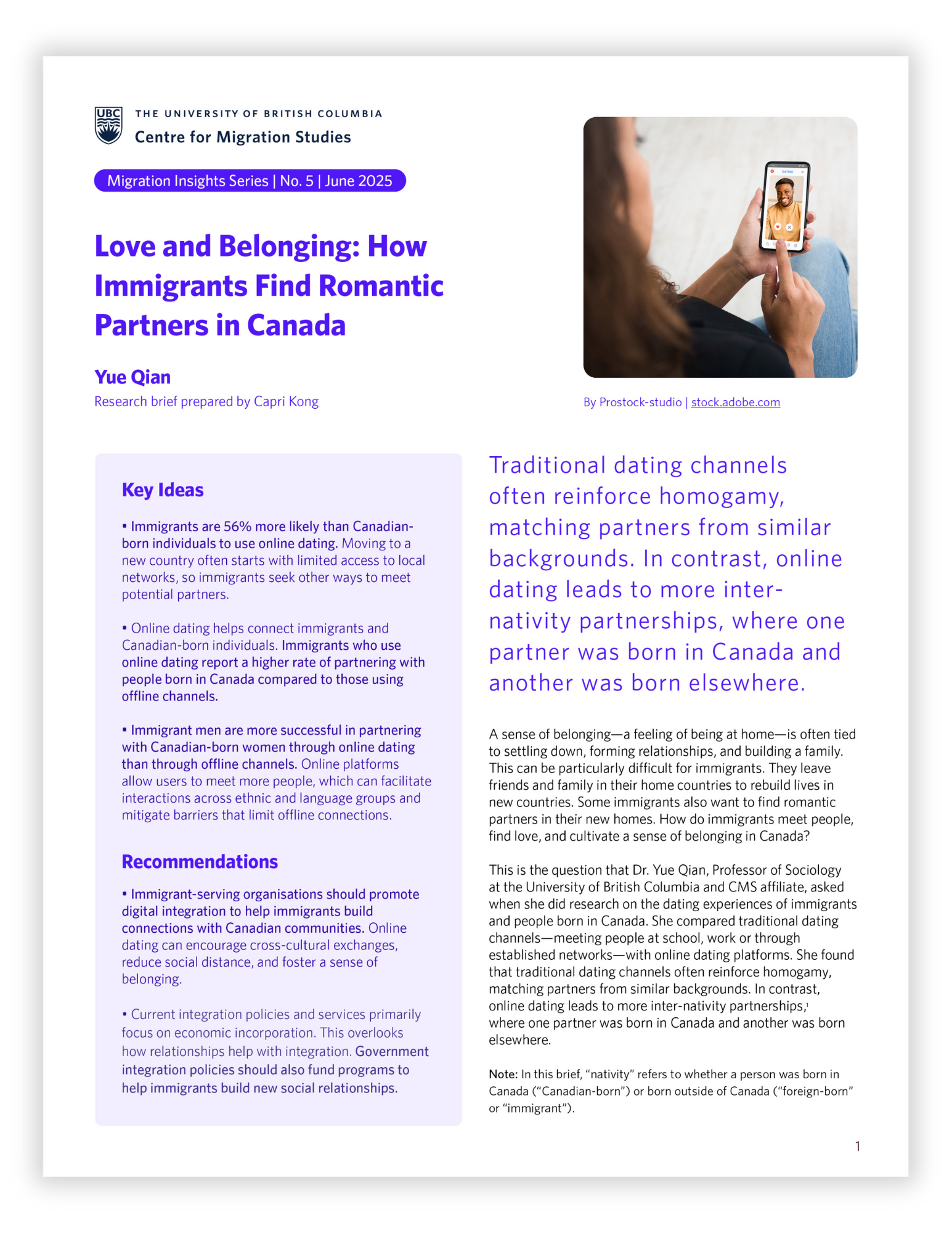For immigrants, online dating is more than just a way to find love; it is a channel through which they can build a sense of home and belonging.
A sense of belonging is often tied to settling down, forming relationships, and building a family. Dr. Yue Qian’s research highlights how online dating platforms promote inter-nativity partnerships, fostering connections between immigrants and Canadian-born individuals. These platforms can create opportunities for immigrants to integrate and cultivate a sense of belonging in their new homes.
Note: In this brief, “nativity” refers to whether a person was born in Canada (“Canadian-born”) or born outside of Canada (“foreign-born” or “immigrant”).
“Calling Canada home isn’t just about work, but also about love and connection. Helping immigrants build meaningful relationships is key to supporting their well-being, belonging, and ability to thrive.”
Key Findings
- Immigrants are 56% more likely than Canadian-born individuals to use online dating. Moving to a new country often starts with limited access to local networks, so immigrants seek other ways to meet potential partners.
- Online dating helps connect immigrants and Canadian-born individuals. Immigrants who use online dating report a higher rate of partnering with people born in Canada compared to those using offline channels.
- Immigrant men are more successful in partnering with Canadian-born women through online dating than through offline channels. Online platforms allow users to meet more people, which can facilitate interactions across ethnic and language groups and mitigate barriers that limit offline connections.
Recommendations
- Immigrant-serving organisations should promote digital integration to help immigrants build connections with Canadian communities. Online dating can encourage cross-cultural exchanges, reduce social distance, and foster a sense of belonging.
- Current integration policies and services primarily focus on economic incorporation. This overlooks how relationships help with integration. Government integration policies should also fund programs to help immigrants build new social relationships.
Implications for Current Events
Summer is the wedding season, a time when love and commitment are celebrated across the country. But for many, the idea of a traditional marriage doesn’t hold the same appeal. A national survey by Statistics Canada found that among adults born in Canada, barely half (51%) were married, while 18% lived in a common-law relationship. In comparison, over two-thirds of adult immigrants (69%) in Canada were legally married, and only 7% lived in a common-law relationship. These differences highlight how migration and cultural backgrounds influence relationship choices. They also raise broader questions about how immigrants find love in their new homes.
Online dating can be one pathway to love, marriage and integration. Dr. Yue Qian’s research reveals the potential of online dating platforms to facilitate interactions and cultural exchanges between immigrants and Canadian-born individuals. Her findings on inter-nativity partnerships—romantic relationships between Canadian-born individuals and immigrants—provide insights into how romantic relationships help immigrants integrate into Canadian society. Dating interactions can bridge cultural understandings and reduce the social distances between groups, helping immigrants to feel at home and thrive in Canada. Despite these opportunities, immigrant men often face barriers due to gender and nativity stereotypes and have the lowest success rate in forming a long-term relationship through online dating.
About the Authors
Yue Qian is a Professor of Sociology at the University of British Columbia. Her research examines gender, family and work, and inequality in global contexts, with a focus on North America and East Asia. She has published over 60 articles in leading journals, including Nature Human Behaviour, Proceedings of the National Academy of Sciences (PNAS), American Sociological Review, Social Forces, and Journal of Marriage and Family. She earned her BA at Renmin University of China and her MA and PhD at The Ohio State University.
Capri Kong is a master’s student in Sociology at the University of British Columbia. She holds a BA degree from the University of British Columbia. Her current research studies the characteristics and dynamics of friendship networks among first- and second-generation immigrants and their influence on immigrants’ sense of belonging and integration into Canadian society.
Copyright: UBC Centre for Migration Studies
Availability: Web & Print
Publication date: June 23, 2025
Pages: 3
This publication is part of the CMS Migration Insights Series. The research briefs synthesize peer-reviewed, published academic research by CMS affiliates.
